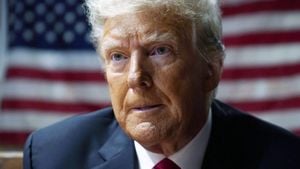China's economic strategy has been multifaceted, especially under the pressures of international sanctions and rising geopolitical tensions. Despite the challenges, the nation's commitment to growth has not faltered, showing resilience particularly evident through its technology sector.
U.S. sanctions on China have attempted to curtail its technological power, putting pressure on over 70 top Chinese tech firms and targeting influential regions like Xinjiang. Nevertheless, China has emerged from these measures not only unscathed but stronger, particularly evident by its dominance in artificial intelligence (AI) patents.
Huawei, founded by Ren Zhengfei, serves as the poster child of China's tech resilience. After being sanctioned by the U.S. government, the telecom giant saw its revenues plummet but managed to pivot, focusing on domestic markets and new industries such as 5G, coal mining, and electric vehicles.
To counteract setbacks from sanctions, Huawei adjusted its strategy to favor domestic consumption. Now, approximately 70% of its revenues come from within China, reflecting the successful shift from global exports to catering primarily to Chinese customers.
Another key to Huawei's recovery has been its symbolic stance as a national champion. With growing nationalistic sentiment, the company's branding has increasingly aligned itself with Chinese interests, bolstering domestic support and driving consumer loyalty.
The Chinese government has also lent significant support to its industries, evident through subsidies and tax incentives. By backing tech companies, including Huawei, the government has solidified its position as both protector and promoter of innovation.
The electric vehicle (EV) market is another sector benefiting immensely from government initiatives. With more than half of all passenger vehicles sold being new energy vehicles, the Chinese EV industry has rapidly expanded, indicating the nation's shift away from traditional fuel vehicles.
China's approach is not without its broader geopolitical stakes, particularly concerning U.S.-China relations. Both nations remain locked in sanctions and retaliatory measures, which only intensify the push for self-sufficiency and bolstered domestic industries.
Bangladesh's political upheaval demonstrates another layer of China's growing geopolitical influence. Sheikh Hasina, the former Prime Minister, has suggested U.S. involvement behind her recent ouster, pointing to pressures surrounding territorial disputes and significant debts owed to China.
China has established deep economic ties with Bangladesh, investing significantly, currently projected at over $6 billion. These financial commitments grant China considerable leverage over any government preceding or succeeding Hasina.
Beijing's involvement has included multiple agreements covering economic and strategic projects, all aimed at strengthening trade ties. This reliance on Chinese investment has led to complex negotiations for debt repayment, which could stall any political shift motivated by U.S. backing.
During Hasina's recent meeting with Chinese officials, hopes for $5 billion in additional aid were discussed, reflective of the complex financial interdependencies at play. Any interim government must navigate these scenarios prudently, balancing both domestic politics and foreign relations.
Trade with China has historically favored its interests, leading Bangladesh to experience substantial deficits within their trading balance. The annual trade deficit was reported to be more than $25 billion last year, exacerbated by the inflow of Chinese investment.
China’s role as Bangladesh’s largest trading partner has expanded, alongside increasing investment from Chinese firms. About 700 Chinese enterprises invested nearly $26 billion between 2016 and 2022, reflecting the deepening economic entanglements.
The strategic partnership extends beyond mere financial engagement; China has also solidified its position as Bangladesh’s top arms supplier, accounting for about 17% of arms acquisitions. This dependence highlights the geopolitical chess at play, with Bangladesh serving as another focal point of U.S.-China rivalry.
Geographically, Bangladesh's location provides significant value for China's maritime access to the Indian Ocean, a major trade route. Such strategic positioning raises alarms as the region closely observes China’s military movements, which include submarine deployments to Bangladeshi ports.
Notably, there are hints of manipulation within local political dynamics, as pro-China factions influenced recent protests against U.S. involvement. Allegations have surfaced claiming organizations received funding from China to instigate civil unrest aimed at countering Indian and American influence.
China's maneuvering has not simply enhanced its economic foothold but has also cultivated influence within Bangladesh's political circles, military, and civilian sectors. This interplay showcases China’s holistic approach to soft power, enriching its expansive footprint within South Asia.
The overarching narrative showcases the delicate balance of power within the Asia-Pacific region. It vividly highlights how China, through strategic influence and investment, continues to reshape national destinies, turning challenges from U.S. pressure and rival nations to opportunities for greater dominance.
With all these layers, it’s clear China is not only reacting to external pressures but also setting the stage for future growth and influence globally. The nation seems poised to exploit these dynamics to emerge even more powerful on the world stage.



